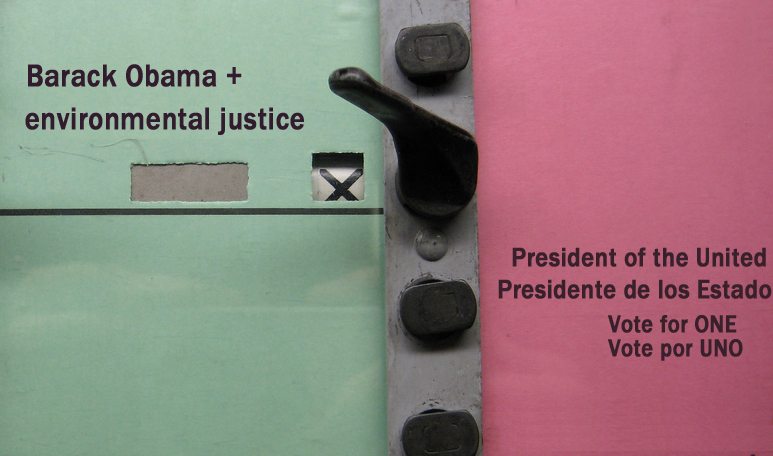ENVIRONMENTAL JUSTICE SHOULD BE A PRESIDENTIAL PRIORITY
November 9, 2012
by Bill Gallegos, Executive Director

President Obama won re-election largely because of the votes of people of color. Voters of color, women, and young people were decisive in his victory. In California, voters of color were the margin of victory for the Democrats–who may now have a two-thirds majority in both houses of the State legislature–as well as in passing Prop 39, which closes a corporate tax loophole and uses the resulting revenues to fund clean energy jobs and public schools.
Both presidential candidates treated the issue of climate change like a high voltage electric wire that they were terrified to touch. Now is the time to end this irresponsible silence. Recent events — super-storm Sandy, more than 4000 heat records broken in the US this year, the drought that virtually destroyed the US wheat crop, the horrendous wildfires in Colorado and New Mexico – make it clear that the Obama Administration must move quickly, thoughtfully, and comprehensively to prevent further, catastrophic climate change. The sea ice that covers the Arctic Ocean is at its lowest level on record, and ocean acidification is at record levels. Last year, global greenhouse gas emissions continued to rise.
President Obama must pursue a strong and comprehensive environmental program – a program that could simultaneously address climate change, stimulate our economy, and reduce the pervasive racial inequality that continues to plague our nation. The election results confirm that he has a powerful base of support from people of color, the ones that were a major difference in his re-election. Polls demonstrate strong support for government action on the environment among communities of color. Environmental justice should be at the center of his environmental program. People of color suffer disproportionately from our fossil fuel energy system because much of it is constructed and operated in or near where they live (as was confirmed two years ago by a United Church of Christ Report, “Toxic Waste and Race at Twenty“), resulting in higher rates of cancer, asthma, heart disease, lower birth weights, miscarriages, etc. than in the white population. This system not only poisons these communities, but emits an enormous amount of greenhouse gases that are putting the planet and its living populations at risk. Recent evidence also suggests that there is a climate gap for poor working class whites in areas such as Appalachia, who suffer the horrendous impacts of mountain-top removal.
At the same time, people of color continue to suffer social and economic inequality, an inequality that has been exacerbated by the Great Recession through the loss of home ownership because of foreclosures, and the impacts of cuts to education, health, and social services, as well as lay-offs in the public sector. This inequality, while abhorrent, has also generated powerful, broad social movements striving for greater democracy and social justice, including environmental justice. They could be a powerful source of support for a strong presidential environmental agenda.
The President needs to lead the charge on the environment. Because he no longer has to worry about re-election, he has more political operating room. He has a strong bully pulpit from which to rally broad public support, and he will need this support to overcome strong Republican opposition. There is no time to waste. The environmental justice and environmental communities must stand together to demand that the President take action now. This action should include insisting that the EPA more forcefully exercise its regulatory authority over greenhouse gas emissions; developing a new economic stimulus program (a “Clean Energy Works Project Administration”) that would train and put people to work; implementing energy efficiency projects for all federal buildings, schools, and other public facilities, as well as local clean energy and public transportation projects; and working to restore our wetlands, and build water conservation projects. The President should also demand rigorous implementation of the Environmental Justice Executive Order, as well as strong enforcement of Title VI and the Clean Air and Clean Water Acts, with special attention to poor communities and communities of color. More immediately, the President should say a definitive “no” to the Keystone XL Pipeline, close off further oil drilling on public lands and waters, and end support for fracking natural gas.
The President’s historical Legacy will be assured if he pursues a comprehensive environmental agenda, centered on achieving environmental justice. Our nation’s economy continues to recover way too slowly. Our global environment is at greater risk than ever and the consequences will only get worse. Racial and wealth inequality continue to erode at the very fabric of our democracy and economy.
President Obama can become not only the first African-American elected to that high office, but the first to lead our nation in its most important peacetime endeavors – saving our planet, putting our people to work, and reducing inequality. The environmental justice community, communities of color, and a broad sector of our population stand ready to engage with the President in this amazing endeavor.


